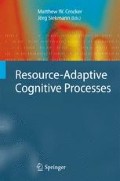Abstract
During the last decade, Bayesian networks (BNs) have been one of the major research topics in the AI community in the area of reasoning under uncertainty. The READY project has been one of the forerunners along these lines – in particular regarding the application of BNs in the context of user modeling/user-adaptive systems (UASs) over the whole period of the collaborative research program 378.
Access this chapter
Tax calculation will be finalised at checkout
Purchases are for personal use only
Preview
Unable to display preview. Download preview PDF.
References
Albrecht, D.W., Zukerman, I., Nicholson, A.E. Bayesian models for keyhole plan recognition in an adventure game. User Modeling and User-Adapted Interaction, 8:5–47 (1998).
Billsus, D., Pazzani, M.J. A hybrid user model for news story classification. In J. Kay (Ed.), UM99, User Modeling: Proceedings of the Seventh International Conference (pp. 99–108). Wien: Springer (1999).
Bohnenberger, T., Brandherm, B., Großmann-Hutter, B., Heckmann, D., Wittig, F. Empirically grounded decision-theoretic adaptation to situation-dependent resource limitations. Künstliche Intelligenz, 16(3):10–16 (2002).
Friedman, N. Learning belief networks in the presence of missing values and hidden variables. In: Proceedings of the 13th International Conference on Machine Learning (1997).
Friedman, N., Goldszmidt, M. Sequential update of Bayesian network structure. In D. Geiger, P.P. Shenoy (Eds.), Uncertainty in Artificial Intelligence: Proceedings of the Thirteenth Conference (pp. 165–174). San Francisco: Morgan Kaufmann (1997).
Friedman, N., Koller, D. Being Bayesian about network structure: A Bayesian approach to structure discovery in Bayesian networks. Machine Learning, 50:95–126 (2002).
Heckerman, D. A tutorial on learning with Bayesian networks. In M.I. Jordan (Ed.), Learning in Graphical Models. Cambridge, MA: MIT Press (1998).
Hoeting, J.A., Madigan, D., Raftery, A.E., Volinsky, C.T. Bayesian model averaging: A tutorial. Statistical Science, 14:382–417 (1999).
Hofmann, R. Lernen der Struktur nichtlinearer Abhängigkeiten mit graphischen Modellen. Ph.D. thesis, Technische Universität München (2000).
Horvitz, E., Jacobs, A., Hovel, D. Attention-sensitive alerting. In K.B. Laskey, H. Prade (Eds.), Uncertainty in Artificial Intelligence: Proceedings of the Fifteenth Conference (pp. 305–313). San Francisco: Morgan Kaufmann (1999).
Horvitz, E., Koch, P., Kadie, C.M., Jacobs, A. Coordinate: Probabilistic forecasting of presence and availability. In A. Darwiche, N. Friedman (Eds.), Uncertainty in Artificial Intelligence: Proceedings of the Eighteenth Conference (pp. 224–233). San Francisco: Morgan Kaufmann (2002).
Jameson, A., Großmann-Hutter, B., March, L., Rummer, R. Creating an empirical basis for adaptation decisions. In H. Lieberman (Ed.), IUI 2000: International Conference on Intelligent User Interfaces (pp. 149–156). New York, ACM (2000).
Jameson, A., Großmann-Hutter, B., March, L., Rummer, R., Bohnenberger, T., Wittig, F. When actions have consequences: Empirically based decision making for intelligent user interfaces. Knowledge-Based Systems, 14:75–92 (2001).
Jameson, A., Wittig, F. Leveraging data about users in general in the learning of individual user models. In B. Nebel (Ed.), Proceedings of the Seventeenth International Joint Conference on Artificial Intelligence (pp. 1185–1192). San Francisco, CA: Morgan Kaufmann (2001).
Lau, T., Horvitz, E. Patterns of search: Analyzing and modeling Web query dynamics. In J. Kay (Ed.), UM99, User Modeling: Proceedings of the Seventh International Conference (pp. 119–128). Wien: Springer (1999).
Moore, A., Lee, M.S. Cached sufficient statistics for efficient machine learning with large datasets. Journal of Artificial Intelligence Research, 8:67–91 (1998).
Müller, C., Großmann-Hutter, B., Jameson, A., Rummer, R., Wittig, F. Recognizing time pressure and cognitive load on the basis of speech: An experimental study. In M. Bauer, P. Gmytrasiewicz, J. Vassileva (Eds.), UM2001, User Modeling: Proceedings of the Eighth International Conference. Berlin: Springer (2001).
Nicholson, A., Boneh, T., Wilkin, T., Stacey, K., Sonenberg, L., Steinle, V. A case study in knowledge discovery and elicitation in an intelligent tutoring application. In J. Breese, D. Koller (Eds.), Uncertainty in Artificial Intelligence: Proceedings of the Seventeenth Conference (pp. 386–394). San Francisco: Morgan Kaufmann (2001).
Olesen, K.G., Lauritzen, S.L., Jensen, F.V. aHUGIN: A system creating adaptive causal probabilistic networks. In D. Dubois, M.P. Wellman, B. D’Ambrosio, P. Smets (Eds.), Uncertainty in Artificial Intelligence: Proceedings of the Eighth Conference (pp. 223–229). San Mateo: Morgan Kaufmann (1992).
Schäfer, R. Benutzermodellierung mit dynamischen Bayes’schen Netzen als Grundlage adaptiver Dialogsysteme. Ph.D. thesis, Lehrstuhl Wahlster, Fachrichtung Informatik, Universität des Saarlandes, Saarbrücken (1998).
Schäfer, R., Weyrath, T. Assessing temporally variable user properties with dynamic Bayesian networks. In A. Jameson, C. Paris, C. Tasso (Eds.), User Modeling: Proceedings of the Sixth International Conference, UM97 (pp. 377–388). Wien: Springer (1997).
Schwarz, G. Estimating the dimension of a model. Annals in Statistics, 6:461–464 (1978).
Webb, G., Pazzani, M.J., Billsus, D. Machine learning for user modeling. User Modeling and User-Adapted Interaction, 11:19–29 (2001).
Wittig, F. Maschinelles Lernen Bayes’scher Netze für benutzeradaptiver Systems. No. 267 in Dissertationen zur Künstliche Intelligenz. Akademische Verlagsgesellschaft Aka GmbH, Berlin (2003).
Wittig, F., Jameson, A. Exploiting qualitative knowledge in the learning of conditional probabilities of Bayesian networks. In C. Boutilier, M. Goldszmidt (Eds.), Uncertainty in Artificial Intelligence: Proceedings of the Sixteenth Conference (pp. 644–652). San Francisco: Morgan Kaufmann (2000).
Author information
Authors and Affiliations
Corresponding author
Editor information
Editors and Affiliations
Rights and permissions
Copyright information
© 2010 Springer-Verlag Berlin Heidelberg
About this chapter
Cite this chapter
Wittig, F. (2010). Comparison of Machine Learning Techniques for Bayesian Networks for User-Adaptive Systems. In: Crocker, M., Siekmann, J. (eds) Resource-Adaptive Cognitive Processes. Cognitive Technologies. Springer, Berlin, Heidelberg. https://doi.org/10.1007/978-3-540-89408-7_14
Download citation
DOI: https://doi.org/10.1007/978-3-540-89408-7_14
Published:
Publisher Name: Springer, Berlin, Heidelberg
Print ISBN: 978-3-540-89407-0
Online ISBN: 978-3-540-89408-7
eBook Packages: Computer ScienceComputer Science (R0)

